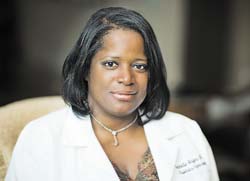HEALTHIER YOU: Reproductive concerns for women
March 18, 2022 by agutting@reviewjournal.com
Filed under Health
BY DR. ANNETTE MAYES, OB/GYN
Endometriosis is a problem affecting a woman’s uterus — the place where a baby grows when a woman is pregnant. Endometriosis is when the kind of tissue that normally lines the uterus grows somewhere else. It can grow on the ovaries, behind the uterus, on the bowels, or on the bladder. Rarely, it grows in other parts of the body.
This “misplaced” tissue can cause pain, infertility, and very heavy periods. The pain is usually in the abdomen, lower back, or pelvic areas. Some women have no symptoms at all. And having trouble getting pregnant may be the first sign they have endometriosis.
Uterine fibroids are the most common noncancerous tumors in women of childbearing age. Fibroids are made of muscle cells and other tissues that grow in and around the wall of the uterus, or womb. The cause of fibroids is unknown.
Risk factors include being African-American or being overweight. The symptoms of fibroids include: Heavy or painful periods or bleeding between periods, feeling “full” in the lower abdomen, urinating often, pain during sex, lower back pain, or reproductive problems, such as infertility, multiple miscarriages, or early labor.
However, some women will have no symptoms. That is why it is important to see your health care provider for routine exams.
Gynecologic cancer is any cancer that starts in a woman’s reproductive organs. Gynecologic cancers begin in different places within a woman’s pelvis, which is the area below the stomach and in between the hip bones.
Interstitial cystitis (IC) is a chronic bladder condition resulting in recurring discomfort or pain in the bladder or surrounding pelvic region. People with IC usually have inflamed or irritated bladder walls that can cause scarring and stiffening of the bladder.
Polycystic ovary syndrome happens when a woman’s ovaries or adrenal glands produce more male hormones than normal. One result is that cysts (fluid-filled sacs) develop on the ovaries. Women who are obese are more likely to have PCOS. Women with PCOS are at increased risk of developing diabetes and heart disease.
For more information, call Las Vegas All Women’s Care at (702) 522-9640. Or visit us at 700 Shadow Lane #165 in Las Vegas.







